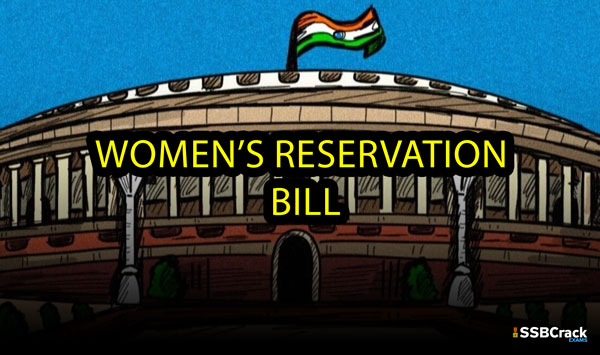The Women’s Reservation Bill 2023 is a landmark legislation that aims to promote political empowerment and eliminate gender inequality and discrimination in India. This bill proposes a 33% reservation for women in the Lok Sabha and State Assemblies, including seats reserved for Scheduled Castes (SC) and Scheduled Tribes (ST). The reservation will be in effect for 15 years, and seats reserved for women will be rotated after each delimitation exercise. In this article, we will delve deeper into the main features, history, implementation, and potential impact of the Women’s Reservation Bill 2023.
Main Features of the Women’s Reservation Bill
The Women’s Reservation Bill 2023 proposes several key features to ensure the representation of women in the political sphere:
- 33% Reservation: The bill seeks to reserve 33% of the seats in the Lok Sabha and State Assemblies for women. This reservation also applies to seats reserved for SC and ST.
- 15-Year Reservation: The reservation for women will be in effect for 15 years from the commencement of the proposed enactment.
- Seat Rotation: After each delimitation exercise, the seats reserved for women will be rotated to ensure equal opportunity and representation.
The Process for the Bill to Become Law
To become law, the Women’s Reservation Bill 2023 must go through a specific process:
- Passing in Parliament: The bill needs to be passed by both houses of Parliament with a special majority. This requires a majority of the total membership of each house and a majority of not less than two-thirds of the members present and voting. Only two MPs voted against the women’s reservation bill in the Lok Sabha on 20 Sep 2023 while the bill was passed with a majority of 454 votes in favour.
- State Ratification: According to provisions of Article 368, the Constitution Amendment Bill will require ratification by at least 50% of the States. This is necessary as it affects the rights of the states.
Once these steps are completed, the Women’s Reservation Bill 2023 will become law and bring about significant changes in the political landscape of India.
History of the Women’s Reservation Bill
The journey of the Women’s Reservation Bill started with the recognition of the importance of political empowerment for women. The Constitution of India already provided reservation for women in Panchayats and Municipalities through the Constitution (73rd Amendment) Act, 1992, and the Constitution (74th Amendment) Act, 1992, respectively.
However, the Women’s Reservation Bill at the national level faced numerous challenges and delays. The first attempt to introduce the bill was made in the Eleventh Lok Sabha in 1996. Subsequent attempts were made in 1998 and 1999, but due to various reasons, including a lack of consensus among political parties, the bill did not progress.
In 2010, the bill was passed in the Rajya Sabha but lapsed in the Lok Sabha due to the dissolution of the House. The recent introduction of the Women’s Reservation Bill 2023 is a renewed effort to advance women’s political representation in India.
Potential Impact of the Women’s Reservation Bill
The Women’s Reservation Bill 2023, if implemented, has the potential to bring about a significant increase in the number of women in Parliament and State Assemblies. Currently, the Lok Sabha has only 14.39% female members, highlighting the need for improved gender representation.
The bill aims to bridge this gap and create a more inclusive political system. By providing reservation for women in key decision-making bodies, it will enable diverse perspectives and voices to be heard. This can lead to better policies and a more equitable society.
However, the impact of the bill will also depend on the commitment of political parties, effective implementation, and the willingness of society to embrace women in leadership roles. It is a step towards achieving gender equality but should be complemented by efforts to address social and cultural barriers that hinder women’s participation in politics.
Implementation Timeline of the Women’s Reservation Bill
The implementation of the Women’s Reservation Bill 2023 is subject to certain conditions and timelines. According to the bill:
- Delimitation Exercise: The provision of reservation for women will come into effect after a delimitation exercise is undertaken. This exercise will take place after the relevant figures from the first census conducted after the commencement of the Constitution (128th Amendment) Act 2023 are published.
- Census Completion: The exact timeline for the delimitation exercise depends on the completion of the census. As of now, there is no clarity on when the census, originally scheduled for 2021, will be completed.
Considering these factors, the implementation of the Women’s Reservation Bill 2023 may not occur before 2029. It will require coordination between various government bodies and stakeholders to ensure a smooth transition.
Challenges and Potential Difficulties
While the Women’s Reservation Bill has garnered support from many political parties, challenges and potential difficulties may arise during its passage and implementation:
- Special Majority Requirement: The bill needs to be passed in both houses of Parliament with a special majority. While many parties support the bill, ensuring the required majority can be challenging.
- State Ratification: The Constitution Amendment Bill requires ratification by at least 50% of the States. Obtaining the consent of all states may pose a challenge due to varying political dynamics.
- Social and Cultural Barriers: Despite legal provisions, social and cultural barriers continue to hinder women’s participation in politics. Overcoming these barriers and changing societal attitudes will be crucial for the effective implementation of the bill.
- Delimitation Process: The delimitation exercise, which is a prerequisite for the implementation of the bill, involves complex administrative procedures. Timely completion and fair execution of the delimitation process may pose challenges.
Despite these potential difficulties, the Women’s Reservation Bill 2023 represents a significant step towards achieving gender equality in Indian politics.
Conclusion
The Women’s Reservation Bill 2023 holds the promise of promoting gender equality and empowering women in the political arena. By providing a 33% reservation for women in the Lok Sabha and State Assemblies, the bill aims to ensure better representation and diverse voices in decision-making processes.
Although the bill faces challenges in its passage and implementation, it presents an opportunity to address gender disparities and promote inclusive governance. With effective coordination, commitment from political parties, and societal support, the Women’s Reservation Bill 2023 can contribute to a more equitable and representative political landscape in India.





















